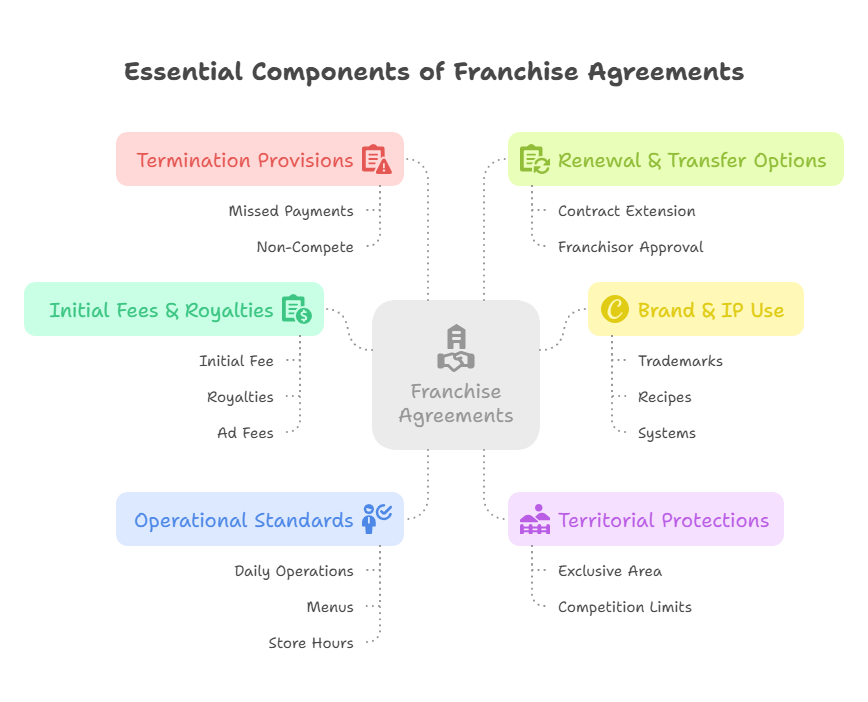Franchising drives Ontario’s economy, with over 1,200 franchises generating more than $7 billion annually. A franchise agreement forms the legal backbone of this business model. It defines how a franchisee operates under a franchisor’s brand. For those eyeing a franchise in Toronto or across Canada, grasping this contract is key to making informed choices.
This guide breaks down the agreement’s structure, protections, and role in Canada’s regulated market. It offers clear insights for franchisees and franchisors alike. Here’s what this guide will help you understand:
- Main components of a franchise agreement.
- Protections for franchisees and franchisors.
- Compliance with Ontario’s franchise laws.
- Risks to watch for in Toronto’s market.
The Legal Blueprint: Understanding Your Franchise Contract
A definition of franchise agreement describes it as a legal contract between a franchisee and a franchisor. It sets terms for running a business using the franchisor’s brand and systems. In Canada, the agreement pairs with the Franchise Disclosure Document (FDD). Ontario’s Arthur Wishart Act (Franchise Disclosure), 2000, requires franchisors to provide the FDD 14 days before signing. The FDD details costs, obligations, and risks.
The agreement ensures clear roles. Franchisees gain brand access. Franchisors maintain consistency. In Toronto, the Arthur Wishart Act protects franchisees by mandating full disclosure. For example, a franchisor must share past lawsuits or bankruptcy details. This transparency helps you decide wisely. A franchise lawyer in Toronto can explain complex terms, ensuring the agreement fits your goals in Ontario’s regulated franchise market.
Essential Components of Franchise Agreements

Franchise agreements outline key terms that shape your business. These clauses clarify what you can expect. Here are the main components:
- Initial Fees and Royalties: You pay a one-time fee, often $20,000 to $50,000, to join the franchise. Monthly royalties, typically 4 to 8 percent of revenue, support training and marketing. Advertising fees, around 1 to 3 percent, fund campaigns.
- Territorial Protections: These grant you an exclusive area in Toronto, like Etobicoke, to prevent competition from other franchisees. Clear terms avoid disputes.
- Brand and Intellectual Property Use: You use trademarks and systems, such as a coffee chain’s recipes. Strict rules protect the brand’s image.
- Operational Standards: These cover daily tasks, like menu offerings or store hours. A Toronto bakery must follow brand recipes.
- Termination Provisions: These list reasons to end the agreement, like missing payments. Non-compete terms may limit new businesses for 1 to 2 years.
- Renewal and Transfer Options: Renewal lets you extend the contract. Transfer allows selling the franchise, with franchisor approval.
An infographic can simplify these terms. Legal review ensures they meet your needs in Toronto’s market.
Protections in Franchise Agreements
The concept of legal protection in franchise agreements offers safeguards for both parties, with some limits. For franchisees, protections include:
- Exclusive Areas: These stop other franchisees from operating in your Toronto zone, like a 5-kilometer radius in Mississauga. This secures your customers.
- Training Support: You get initial training, like staff onboarding, and ongoing help, such as manuals. A Toronto restaurant might receive food safety training.
- Brand Access: You use the franchisor’s trademarks, boosting your market edge in Toronto’s busy core.
For franchisors, protections include:
- Intellectual Property Security: Rules ensure proper trademark use. A franchisor might enforce logo standards across Canada.
- Brand Consistency: Operational guidelines keep quality uniform, from Vancouver to Toronto.
Dispute resolution, like arbitration, resolves conflicts without costly court battles. Ontario’s Arthur Wishart Act ensures fair dealing. It allows rescission within two years for poor disclosures.
For example, a Toronto franchisee rescinded an agreement after discovering hidden franchisor debts. Limits include non-compete clauses, restricting new businesses for 1 to 2 years, and breaches, like late payments, risking termination. Vague terms can cause disputes, especially in Toronto’s crowded market. A franchise lawyer in Toronto can spot these issues early. Learn how tailored legal guidance has supported over 80 franchise locations across Canada.
Franchisee Rights and Responsibilities
The balance of franchisee rights and obligations supports your success while upholding brand standards. Your rights include:
- Brand Usage: You use trademarks and systems, like a retail chain’s logo, to attract Toronto customers.
- Training Support: You receive initial training, like a week-long program, and ongoing help, such as software updates, meeting Ontario’s standards.
- Marketing Assistance: Franchisors provide ads, funded by your 1 to 3 percent revenue contribution. GTA-specific campaigns can boost your Toronto location.
Your responsibilities include:
- Operational Adherence: Follow guidelines on quality and service. A Toronto gym must maintain equipment standards.
- Financial Duties: Pay royalties, 4 to 8 percent of revenue, and marketing fees. Regular reports ensure transparency.
- Regulatory Compliance: Meet audits and Toronto’s licensing rules.
Post-termination, you stop using the brand and may face non-compete terms for 1 to 2 years in Toronto. The Arthur Wishart Act ensures fair disclosure, like sharing litigation history. Legal guidance aligns these terms with your goals.
Franchisor Duties in Agreements
The concept of franchisor responsibilities in agreement ensures support for franchisees and brand protection. Key duties include:
- Training Provision: Franchisors offer initial and ongoing training, like point-of-sale training for a Toronto store.
- Intellectual Property Management: They protect trademarks, preventing misuse to maintain brand value.
- Regulatory Adherence: Compliance with Federal Trade Commission rules and Ontario’s Arthur Wishart Act includes providing a detailed FDD.
- Marketing Efforts: Franchisors run campaigns, often funded by franchisee fees. GTA ads can help Toronto locations.
- Conflict Resolution: Arbitration or mediation clauses settle disputes, like royalty issues, efficiently.
These duties support your success while keeping standards high. In Toronto, localized marketing, like ads for Yonge Street, can drive customers. Knowing these duties helps you pick a committed franchisor.
Compliance and Risk Management in Toronto
Toronto franchises must follow strict rules under Ontario’s Arthur Wishart Act. The act requires a complete FDD, shared 14 days before signing, covering costs and risks. Compliance includes:
- Financial Reporting: Submit monthly revenue reports. Missing these risks penalties.
- Operational Standards: Meet brand and local rules, like Toronto’s health codes.
- Payment Obligations: Pay royalties, 4 to 8 percent of revenue, on time.
Risks include:
- Liability Exposure: You may face lawsuit costs, like for a customer injury, if the agreement limits franchisor responsibility.
- Dispute Challenges: Unclear arbitration terms raise costs. Mediation is often cheaper.
- Post-Termination Limits: Non-compete terms may block new businesses in Toronto for 1 to 2 years.
- Territorial Conflicts: Vague boundaries can allow nearby franchisees, hurting sales.
The Arthur Wishart Act allows rescission for poor disclosures. A Toronto franchisee once recovered funds due to hidden franchisor issues. Legal review prevents such risks.
Why Pick Cloudhaus Law? Your Success, Our Guarantee
We’ve helped more than 80 franchise locations across Canada set up their legal structures the right way from the start. Whether you’re buying your first unit or scaling to a multi-unit enterprise, the legal groundwork matters.
At Cloudhaus Law, we provide:
- Flat-fee pricing, so there are no billing surprises
- Legal support from a dual-licensed lawyer (Canada/U.S.)
- Experience across industries including retail, food service, and service-based franchises
- Virtual consultations tailored for Ontario and national clients
One client who opened a franchise in Mississauga started with one location. We helped them incorporate, meet franchisor requirements, and later restructure to support two additional units. Their expansion was seamless because their legal base was sound from day one.
Common Questions About Franchise Agreements
What is included in a standard franchise agreement?
Standard agreements cover fees ($20,000 to $50,000), royalties (4 to 8 percent), territorial protections, intellectual property rules, operational standards, termination provisions, and renewal options. Ontario’s Arthur Wishart Act ensures FDD compliance.
How does a franchise agreement protect the franchisee?
It offers exclusive areas, training, and brand access. Ontario’s laws ensure fairness, but legal review spots risky terms.
Can a franchise agreement protect me from competition?
Exclusive territory clauses block other franchisees in your Toronto area. Legal checks ensure enforceability.
Are franchise agreements legally binding?
Yes, breaches like late payments risk penalties. Legal guidance avoids errors.
What rights do I have under a franchise agreement?
You gain brand use, training, and marketing. Ontario’s act ensures fair disclosure.
Can I negotiate the terms of a franchise agreement?
Yes, fees or territories can be negotiated. Legal support improves outcomes.
How long does a typical franchise agreement last?
Agreements last 5 to 10 years, with renewal if standards are met.
Final Thoughts: Clarity Today, Confidence Tomorrow
Franchise agreements are more than just contracts. They form the foundation of your long-term business success. In a competitive market like Toronto or anywhere across Canada, understanding your rights, obligations, and risks is essential.
Whether you’re preparing to sign your first agreement or reviewing terms before renewal, legal clarity helps you move forward with confidence. With Ontario’s franchise laws adding complexity, having the right legal partner ensures you stay protected, compliant, and positioned for growth.
At Cloudhaus Law, we do more than explain the fine print. We help you build a franchise future that supports your vision. Let us guide you in creating a solid legal base that keeps your business strong from the start.
Ready to review your franchise agreement with clarity and confidence? Book your free consultation today at cloudhauslaw.com.






